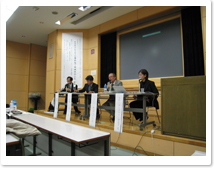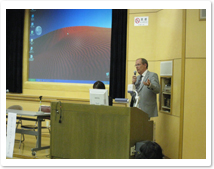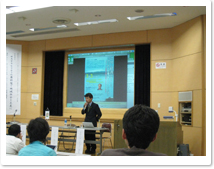【Naoki Masuhara: An introduction to the Coalition of Local Government for Environmental Initiative and its recent activities including Yusa Conference】
Firstly, Mr. Masuhara explained what COLGEI (Coalition of Local Government for Environmental Initiative) was about. COLGEI is an organization, which aims to plan an environmentally friendly village. Since the Earth Summit in 1992, COLGEI has held a conference annually, which has created quite a discussion among its participants. This year, the conference was held in Yamagata prefecture. The conference report is detailed below.
 On May 27th 2008, the opening ceremony was held and opened by choral singing. On the morning of the second day, people joined in a visiting tour to learn about “environmental-friendliness” in Yusa. In the afternoon, a seminar was held about issues surrounding global warming. On the last day, the general assembly meeting was held, where environmental problems were classified into nine categories. For example, the global environment, air pollution, trash problems etc. In addition to this, problems in each community were highlighted and clarified. Next year, the conference will be held in Tajimi. During the conference in Tajimi, participants will discuss the efforts against global warming previously discussed at the Toyako Summit. It is hoped that activities against global warming practiced in each community will be much more concrete and advanced by then. On May 27th 2008, the opening ceremony was held and opened by choral singing. On the morning of the second day, people joined in a visiting tour to learn about “environmental-friendliness” in Yusa. In the afternoon, a seminar was held about issues surrounding global warming. On the last day, the general assembly meeting was held, where environmental problems were classified into nine categories. For example, the global environment, air pollution, trash problems etc. In addition to this, problems in each community were highlighted and clarified. Next year, the conference will be held in Tajimi. During the conference in Tajimi, participants will discuss the efforts against global warming previously discussed at the Toyako Summit. It is hoped that activities against global warming practiced in each community will be much more concrete and advanced by then.
【Conny Sevehem: How to build cheerful communities based on the guidelines of eco-municipality in Sweden】
 Secondly, Mr. Sevehem gave a speech about various activities concerning eco-municipalities and various efforts for sustainability in Sweden. SEKOM (The National Association of Swedish Eco-Municipalities) is a municipal network, which aims to become the leading network for a sustainable Sweden. SEKOM started in 1983. Now, 25% of the municipalities in Sweden belong to the SEKOM network. SEKOM organizes various international activities, in association with Italy, Ireland, Japan, Kenya, Ethiopia, America, and many more countries. Mr. Sevehem’s speech mainly focused on Varberg, practicing the following activities to achieve the set goals. These are, Secondly, Mr. Sevehem gave a speech about various activities concerning eco-municipalities and various efforts for sustainability in Sweden. SEKOM (The National Association of Swedish Eco-Municipalities) is a municipal network, which aims to become the leading network for a sustainable Sweden. SEKOM started in 1983. Now, 25% of the municipalities in Sweden belong to the SEKOM network. SEKOM organizes various international activities, in association with Italy, Ireland, Japan, Kenya, Ethiopia, America, and many more countries. Mr. Sevehem’s speech mainly focused on Varberg, practicing the following activities to achieve the set goals. These are,
1) to reduce CO2 emissions per person to less than 4 tons.
2) to produce 19kilo of GWh biogas
3) to use biogas for 20% of car fuel
4) to serve organic food for total more than 15% of food in restaurants.
1. Utilization of residual heat from paper factories
2. Pellet boiler
3. Project for reviving the Himlean River
4. Maintenance of motorways and sidewalks
5. Promotion of eco-driving
6. Promotion of cargo-carrying
7. Promotion of bicycles
8. Wind power generation
9. Hydraulic power generation
10. Production of biogas
He finished his speech with the following remarks: “Thinking about environmental problems is taking responsibility for the future. We can not live in the future in the same way as we have been doing as there is no turning back in reality. This is the only way to continue living on this earth to build an ecological future, not in a philosophical or political way. We need to welcome our future children to our earth in a friendly environment.”
【Shinichi Kusajima: After the international conference, held by SEKOM】
 In Tsuruoka, of which Shinichi Kusajima is a council member, a dam was constructed in 2001. Then, instead of groundwater, tap water started to reach its citizens. This was constructed against the opinions of Tsuruoka residents. In fact, as a result of the construction of the dam, water quality worsened and water prices doubled. This led Shinichi Kusajima to think of the problems surrounding the dam as his mission from the perspective of sustainable residents. In Tsuruoka, of which Shinichi Kusajima is a council member, a dam was constructed in 2001. Then, instead of groundwater, tap water started to reach its citizens. This was constructed against the opinions of Tsuruoka residents. In fact, as a result of the construction of the dam, water quality worsened and water prices doubled. This led Shinichi Kusajima to think of the problems surrounding the dam as his mission from the perspective of sustainable residents.
Shinichi Kusajima believes you can find solutions for building a sustainable community from the activities of SEKOM. He explained about various cases in Sweden, where “eco” is adapted into the way municipalities work and the way people live.
1. Establishment of Green Zone in Umea
2. Well-developed schools for environmental education
3. Learning in eco-villages
4. Visitor Center in the World Heritage, High Coast
5. Transportation
6. Electricity
The activities mentioned above are based on the concepts of “knowledge”, “democracy”, “integration”, “network across all sectors” and “process”. These concepts are based on the method of “backcasting”, meaning to clarify a concrete vision for the future such as in 20 or 40 years. Then, projecting ways from the present to the future to achieve set goals. Such concepts are clearly realized in environmental education for children aged five or six in Sweden. Such education planned in the long run must be the source for an eco-society in Sweden.
A staff member involved in an eco tour in Sweden called people who seek for and realize sustainable society without being bound by common sense, “fire souls”. The fact that people with fire souls and the Swedish system which supports their activities are interacting with each other must be pressing “environmentally advanced Sweden” forward to the future. Five years have passed since the “United Nations Decade of Education for Sustainable Development” started. Each “fire soul” in Japan began to collaborate on various areas such as the environment, peace and development. Therefore, the collaborated “fire souls” need to influence a wider audience and lead them to greater power for the benefit of the social movement. |